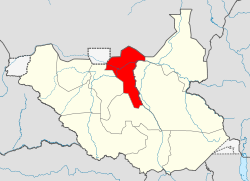Khartoum says Darfur rebels’ presence in S. Sudan threatens cooperation treaty
October 20, 2012 (KHARTOUM) — A leading member of the ruling National Congress Party (NCP) warned the South Sudanese government against continuing to harbour Darfur rebel groups saying that it poses a direct threat to their cooperation agreement.

Khartoum says JEM have a military camp outside Bentiu. Last April, the Sudanese government accused the rebel group of participating in the capture of Heglig by the South Sudanese army (SPLA).
The SPLA withdrew after holding the oil-rich region for 10 days but the incident forced the UN Security Council issue a resolution for the two sides to resolve their border disputes and other post separation issues or face sanctions.
Qutbi, who is a former head of Sudanese intelligence service, was a critic of the Naivasha peace process which led to the signing of the Comprehensive Peace Agreement (CPA) with the Sudan People’s Liberation Movement in 2005, which six years later led to South Sudan’s independence.
He also recently slammed the Sudanese negotiating team in Addis Ababa for being concessional with the South Sudanese delegation.
He stressed that the JEM leaders’ alleged visit to Unity State undermines the agreements signed by the two countries on 27 September including security arrangements which states that both sides must cease any support to rebel groups on both sides of the new international border.
He further pointed out that Gibril’s visit to Bentiu confirms the determination of Sudanese rebels to pursue war in South Kordofan State. After the NCP rejected a framework agreement with the SPLM-North last year the group formed an alliance with JEM and the two factions of Darfur’s other main rebel groups -the Sudan Liberation Army (SLA).
Fighting in Darfur began in 2003. The conflict in South Kordofan and Blue Nile began in 2011 when the northern sector of the SPLM refused to disarm before the aspects of the the 2005 peace related to the “Two Areas” were implemented.
Since South Sudan’s independence SPLM-North has declared itself distinct and no longer connected to main body of the SPLM, which is the ruling party of new nation.
A joint security committee headed by defence ministers from both sides is due to meet soon to discuss operationalisation of the buffer zone and the deployment of joint patrols along the border.
The two parliaments in Khartoum and Juba have approved the cooperation agreements which are supposed to end the strained relations between the two countries and settle the outstanding issues.
Thabo Mbeki, African Union mediator, will report to the AU Peace and Security Committee next Wednesday 24 October. The meeting is expected to endorse his report and recommendations and refer it to the UN Security Council.
(ST)
